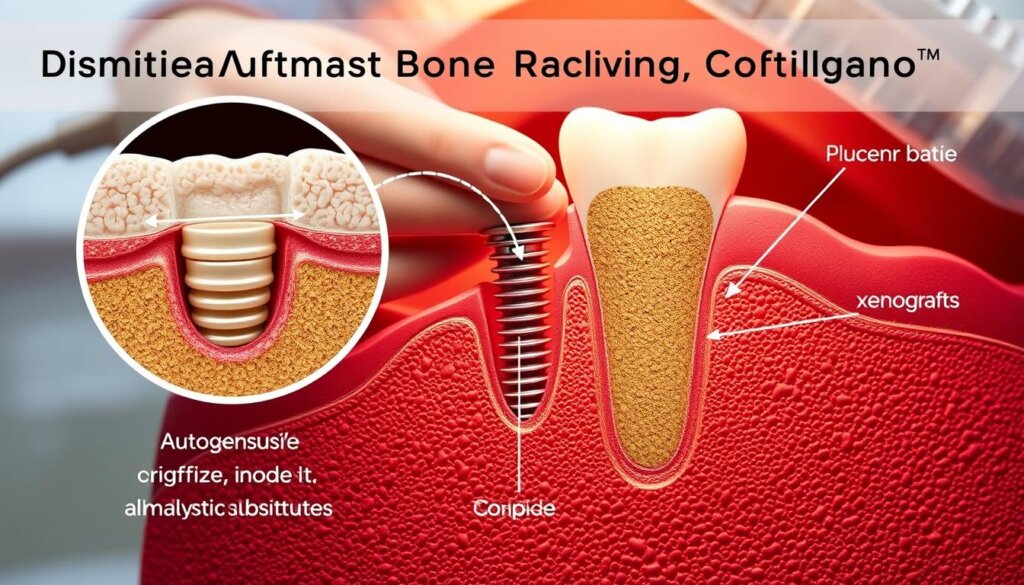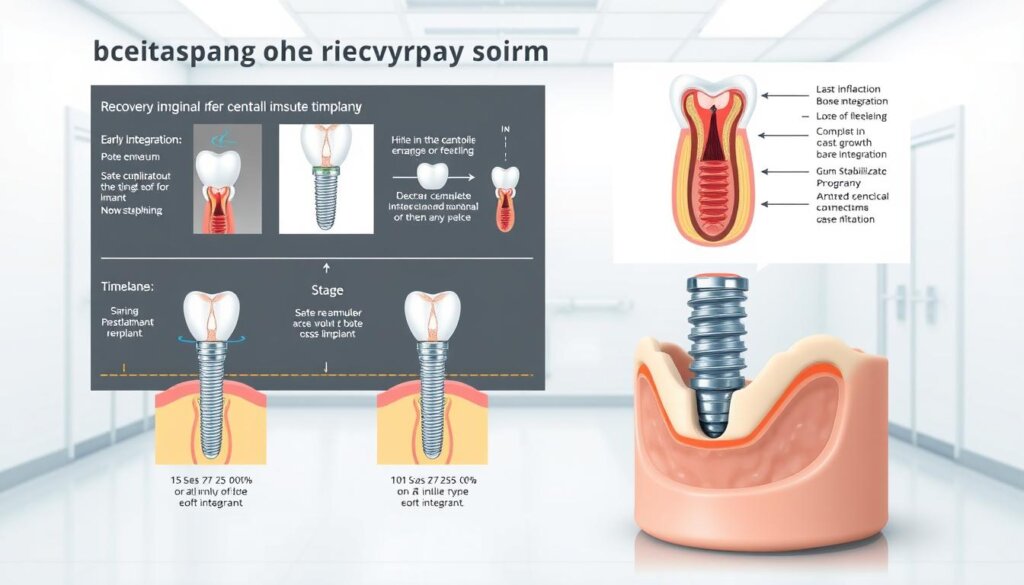Can Anyone Get Dental Implants?
Did you know over 3 million Americans have dental implants? This number grows by 500,000 each year. This increase raises a big question about dental implant eligibility. It’s vital for those thinking about this option. Dental implants are a reliable way to replace missing teeth. They work like natural tooth roots and connect to the jawbone, improving looks and function.
When it comes to dental implant candidacy, several health checks are needed for the best results. Mainly, a person needs healthy gums and enough bone for the implant. But, even if you don’t meet these criteria at first, methods like bone grafting may help. This means that more people might have a chance at getting dental implants than they think.
Getting dental implants starts with a detailed check-up. This includes dental exams and x-rays. These steps help understand your oral health better. They make sure the dental implants will suit your individual needs.
Key Takeaways
- The number of people getting dental implants is quickly increasing.
- Checking dental implant eligibility is key before the procedure. It looks at overall and oral health.
- Having enough bone is important, but new methods like bone grafting help more people qualify.
- Detailed pre-treatment checks are essential to make sure dental implants will work for you.
- Understanding what’s needed for considerations for dental implant candidacy is the first step towards fixing tooth loss with implants.
Understanding Dental Implants and Their Benefits
Dental implants are a big step forward in fixing teeth, helping not only with missing teeth but also with bone health. We’ll look at what dental implants are and the many ways they’re better than old dental methods.
What are Dental Implants?
Dental implants are fake roots put in surgically, made of titanium, to hold new teeth in the jawbone. They act like real teeth roots, providing a firm base for false teeth, crowns, bridges, or dentures. Experts such as periodontists or oral surgeons usually do this process in steps, including placing the implant, letting it fuse with the bone, and then attaching the new tooth.
Benefits of Choosing Implants Over Other Options
Choosing dental implants offers many benefits beyond just looking good. These benefits improve oral and overall health. Among these benefits are:
- Enhanced Comfort: Implants don’t move around like dentures, making them more comfortable and less bothersome.
- Prevention of Bone Loss: Implants keep and promote natural bone growth, helping to stop bone loss.
- Improved Oral Health: Implants don’t need changes to surrounding teeth, so more of your natural teeth are kept safe.
- Durability and Reliability: Implants are tough and stable, lasting a long time and are as reliable as real teeth.
- Improved Eating and Speaking: Securely fitted implants let you chew properly and speak clearly.
Knowing about dental implants and their benefits is helpful for people thinking about getting them. You should talk with your dentist about your needs for dental implants to find the best plan for you.
Factors Impacting Eligibility for Dental Implants
Knowing what you need for dental implants is key if you’re thinking about it. Health conditions can greatly affect whether you can get dental implants. Let’s look at what’s important before going for dental implantation.
Age Considerations
Age is big when it comes to dental implants. Adults are usually the right fit because their jawbones are done growing. For younger folks, we must wait or plan carefully due to their still-developing jawbones.
Overall Health Status
Your overall health matters a lot for dental implants. Issues like unchecked diabetes or heart problems can mess with healing. Those going through treatments affecting bones face extra hurdles for their implants to work well.
Oral Health Requirements
Having a healthy mouth sets the stage for successful dental implant work. Implant needs include healthy gums and enough bone for implant support. Below are key oral health points for implants:
| Oral Health Condition | Importance for Implant Success |
|---|---|
| Periodontal Health | Essential to support the implant and avoid perimplantitis |
| Quality and Quantity of Bone | Directly affects the stability and longevity of the implant |
| Adequate Oral Hygiene | Reduces the risk of infections that could compromise implant durability |
Talking with a dental expert is key to seeing if you’re a match for this dental improvement. Each point we’ve talked about is critical to check for dental implant eligibility and to ensure it lasts a long time.
The Role of Bone Density in Implant Success
In the world of dental implant consultation criteria, the importance of bone density can’t be overstated. It’s key for implant stability and longevity. A lack of it raises the risk of implant failure, making patient evaluation crucial.
Importance of Bone Density
Dental implants need a strong bone for success. The bone provides a solid base for the implants, through a process called osseointegration. If bone density is low, the implant might not integrate well, risking failure. This issue is often spotted during dental implant consultation criteria checks.
Options for Bone Grafting
If bone density is lacking, bone grafting may be needed. This surgery helps bone grow denser and stronger. It ensures the jawbone can support the implant properly.
| Type of Bone Graft | Source | Benefits |
|---|---|---|
| Autograft | Patient’s own bone | High success rate due to biocompatibility |
| Allograft | Donor bone | Avoids extra surgery for the patient |
| Xenograft | Animal bone | Available quickly, shortens surgery time |
| Alloplast | Synthetic materials | Customizable for complex bone issues |
The table shows different bone grafting methods. Each one helps increase bone density in its own way. With these methods, dental pros can tackle bone density concerns for implants, leading to better patient results.
Conditions That May Disqualify Candidates
Some health conditions can affect if you can get dental implants. It’s very important for those thinking about implants to know these conditions.
Smoking and Its Effects
Smoking can really slow down healing needed for implant success. Nicotine makes it harder for blood to flow, which means the jawbone might not bond well with the implant. This could make implants fail more often. If you smoke, you need to talk about risks and think about stopping before getting an implant.
Diabetes and Healing Challenges
Uncontrolled diabetes can make it tough for your body to heal, which is crucial after getting an implant. If your diabetes is under control, you might still be able to get implants. But, it means you have to work closely with your doctor.
Gum Disease and Its Management
If you have gum disease, it can weaken the foundation for implants. You must treat and take care of gum disease before getting implants. This helps make sure your implants will last and stay stable.
To have a good chance at successful dental implants, these conditions must be managed well. That’s why it’s key to talk about these health issues with your dentist. This way, you’ll know if you can qualify for dental implants.
Evaluating Your Oral Hygiene for Implants
Dental experts stress the requirements for dental implants. This includes the oral hygiene considerations for dental implants. Having good oral health is essential for the lasting success of implants. It’s also critical for those looking to get dental implants. Before you can be considered, a detailed check of your oral hygiene habits is necessary.
Importance of Good Oral Care
Great oral hygiene is key for anyone thinking about dental implants. If you have healthy gums and enough bone without periodontal disease, you’re on the right track. Good oral care means brushing and flossing regularly. Also, seeing your dentist on time helps maintain implants for years.
- Daily brushing and flossing cut down infection risks.
- Regular dental check-ups catch and fix problems early.
- Professional cleanings are key to removing tough calculus affecting implant success.
Pre-Treatment for Ineligible Candidates
If you’re not ready for dental implants due to oral hygiene or other issues, there are ways to get you there. Improving gum health and fixing bone problems are the main goals. These steps not only make you ready for implants. They also boost your overall oral health.
- Intense cleaning fights periodontitis.
- Bone grafts may help improve jawbone quality.
- Regular check-ups track your improvement and implant readiness.
The Consultation Process: What to Expect
Starting dental implant procedures begins with a key consultation. This phase helps to see if you’re a good fit for dental implants and creates a plan just for you. It’s vital for making sure you’re ready for dental implants, aiming for the best results.
In this first meeting, the main goal is to find out if you can have dental implants. The doctor will look closely at your health history and do a full check-up. They might use X-rays or CT scans to look at your bone and gums.
This time is also perfect for you to get involved in your care. You can ask questions to understand more about the implant process. You should ask about healing time, how to take care of your implants, what risks there might be, and how long the implants will last.
Knowing these details well makes the consultation better. And it helps you make choices that are good for your health and what you want for your lifestyle.
Financial Considerations for Dental Implants
When thinking about getting dental implants, it’s important to look at the financial considerations for dental implants. This includes not just the cost of the surgery, but also the long-term benefits. Knowing the average cost of dental implants and checking out dental implant insurance coverage are key steps.
Average Cost of Dental Implants
The cost for average cost of dental implants can differ a lot. It depends on where you live, the dentist’s skills, and the materials used. Usually, one implant can cost between $1,500 and $2,000. But this doesn’t include the extra procedures you might need. If you need many implants, the price could rise significantly.
Insurance Coverage Options
When looking at dental implant insurance coverage, many dental plans don’t fully cover implants since they see them as cosmetic. Yet, some plans might cover parts of the process, like the crown. It’s smart to talk to your insurance to know exactly what’s covered. This could help ease the cost of getting implants.
- Review your dental insurance plan in detail to determine the extent of coverage for dental implants.
- Consider flexible payment plans or financing options offered by dental clinics.
- Explore alternative insurance options that offer broader coverage for dental implant procedures.
Alternative Tooth Replacement Solutions
Many people find dental implants a great way to replace missing teeth. Yet, some can’t get implants due to health issues or cost. So, alternatives like dentures and dental bridges are good options. They meet different needs, making dental care more flexible and accessible.
Dentures are chosen by many for their flexibility and easy use. They fill in for missing teeth and help your mouth work right and look good. Since you can take them out to clean, they’re handy, especially for older folks or those who can’t easily have surgery.
Dental bridges are more of a stay-put choice. They use crowns on teeth next to the gap and a fake tooth in the middle. Bridges stick to your natural teeth or implants, and they blend in well with your natural teeth color.
| Feature | Dentures | Dental Bridges |
|---|---|---|
| Installation | Non-surgical, removable | Fixed, requires some dental preparation |
| Cost | Generally more affordable | Varies, generally higher than dentures |
| Duration of Use | 5-8 years with proper care | 10-15 years with proper maintenance |
| Aesthetic Match | Good, with options for customization | Excellent, closely matches natural teeth |
Dentures and dental bridges each have unique benefits. The choice often comes down to what the patient needs, their budget, and lifestyle. Dentures are adaptable and budget-friendly and dental bridges are durable, offering a stable choice but might cost more and need careful oral care.
Post-Procedure Expectations for Candidates
After getting dental implants, it’s important for patients to know what comes next. This includes the recovery timeline and how to handle pain. Knowing these details helps patients heal smoothly.
Right after the surgery, you might feel some pain and swelling. This is normal and can be reduced with pain medicines. Be sure to do exactly what your dentist says to heal the best way.
| Week | Expectations | Recommended Actions |
|---|---|---|
| 1-2 | Mild to moderate discomfort | Take prescribed pain medication, maintain a soft diet, and apply ice packs. |
| 3-4 | Decreased swelling | Continue soft diet, begin gentle oral hygiene around the implant site. |
| 5-6 | Healing and integration of implant | Gradually resume normal diet, attend follow-up visits for progress assessment. |
| 6 months | Complete integration and healing | Follow routine dental check-ups, maintain excellent oral hygiene. |
Recovery time is different for everyone. It depends on your age, health, and how complex the surgery was. Usually, it takes 3 to 6 months for the implant to fully bond with the bone. Following care tips and dealing with pain properly is key to doing well.
Longevity of Dental Implants
When you think about fixing your teeth, how long dental implants last is important. They are known for being strong and lasting a long time. These implants are a great choice for anyone wanting to improve their smile and dental health for years.
The strength of dental implants can mean they last a lifetime if you take care of them right. How the surgery is done, what the implant is made of, and how you look after your teeth all matter. These things help make your dental implants last longer.
- Quality of Surgical Placement: Getting the implant put in correctly is key for it to work right and last.
- Oral Hygiene Practices: Brushing, flossing, and seeing your dentist regularly can stop diseases around the implant.
- Regular Dental Check-Ups: Visits to the dentist make sure the implant stays healthy and works as it should.
Knowing these points shows that dental implants are more than just for looks; they’re a smart choice for your oral health. They bring back your smile and how well you can eat. Taking good care of them shows the role you play in keeping your mouth healthy for a long time.
The Importance of Choosing a Qualified Specialist
The skill and qualifications of the specialist matter a lot for dental implants. Choosing the right qualified dental implant specialist affects how well the implants work in the long run. It’s important to look at the specialist credentials and their record of dental implant success rates.
Credentials to Look For
Checking the education and certificates of a dental implant specialist is key. They should be certified as periodontists or oral surgeons. This shows they have deep training in implantology. Also, accreditations from top dental groups prove a specialist’s dedication to high-quality dental care.
Experience and Success Rates
A specialist’s experience shows in their dental implant success rates. With more experience comes a higher chance of success. This includes dealing with tough cases. It’s a good idea to ask about these success rates and look at any testimonials or case studies.
| Qualification | Description | Impact on Implant Success |
|---|---|---|
| Board Certification | Indicates rigorous training and adherence to national standards | Highly positive |
| Years of Experience | Experience specifically in dental implants | Correlates with higher success rates |
| Success Rate Percentage | Percentage of successful implants over total procedures performed | Direct indicator of proficiency and expertise |
Picking a very qualified and experienced implant specialist raises the chances of a good implant. It also means any problems can be taken care of well. This careful choice, focused on solid specialist credentials, is key to the best results in getting dental implants.
Preparing for Your Dental Implant Procedure
Getting ready for dental implants means paying close attention to care before the procedure. This helps make sure the implants work well and last a long time. It’s important to do what your dentist or surgeon says for the best results.
Before the surgery, keeping your mouth clean and following certain eating and medicine rules are key. Good oral hygiene helps lower the chance of infection and aids healing. Doctors will give you a plan to help make your mouth as healthy as possible before the operation.
| Pre-Procedure Action | Details | Reasons |
|---|---|---|
| Maintain Oral Hygiene | Regular brushing, flossing, and antiseptic mouthwash | Reduces risk of infections |
| Medication Compliance | Antibiotics or other prescriptions as advised | Prevents complications during and post-surgery |
| Nutritional Guidelines | Avoid hard foods and smoking prior to surgery | Minimizes physical stress on dental structures |
It’s also important to follow your dentist’s after-surgery care instructions closely. This includes taking pain medicine as prescribed, eating soft foods, and going to check-up appointments. These steps help you heal faster and make the implants more successful.
Following both before and after care advice leads to easier recovery and better results with dental implants. It’s about more than just the surgery itself. How well patients prepare and stick to their dentist’s care plan matters a lot.
Potential Risks and Complications
Dental implants have a high success rate. However, they come with potential risks of dental implants and dental implant complications. Knowing these risks and how to lower them is key for patients and dentists.
Common Risks Associated with Implants
Getting a perfect smile with implants can face issues like infection, nerve damage, or implant failure. Poor oral hygiene, not enough bone, or your body not accepting the implant can cause these problems.
- Infection at the implant site
- Damage to surrounding teeth or blood vessels
- Sinus problems when upper jaw implants protrude into sinus cavities
- Implant rejection or failure to integrate with the jawbone
How to Mitigate Risks
To lower risks with implants, taking specific steps and planning is important. Picking a skilled dentist and following care tips after surgery greatly reduces complications.
| Risk Factor | Prevention Strategy |
|---|---|
| Infection | Keep up with strong oral hygiene and all care advice after surgery. |
| Nerve Damage | Make sure of careful planning and imaging before surgery to dodge nerve areas. |
| Implant Failure | Select a dentist with good success and go to all follow-up appointments. |
It’s vital to follow thorough risk mitigation for dental implants plans. Regular visits to the dentist ensure your treatment’s success, giving both health perks and the joy of a confident smile.
Conclusion: Making an Informed Decision
Choosing to improve your smile with dental implants is a big step. It requires understanding a lot and being clear about your health. Before deciding, you need to look at your overall health, your mouth’s health, and your lifestyle. It’s important to know if you can keep up with taking care of your implants.
It’s key to understand what getting implants involves. They’re not like dentures that you can take out; they stay in your mouth. Getting them takes several months and you’ll need to look after them well. You also have to think about the cost and any extra treatments you might need, like bone grafting.
In the end, talking to dental experts you trust is crucial. They help you make a wise choice by offering advice tailored to you. Considering all these important factors helps ensure you make the right decision. This way, you start your journey toward better dental health and confidence knowing what to expect.








